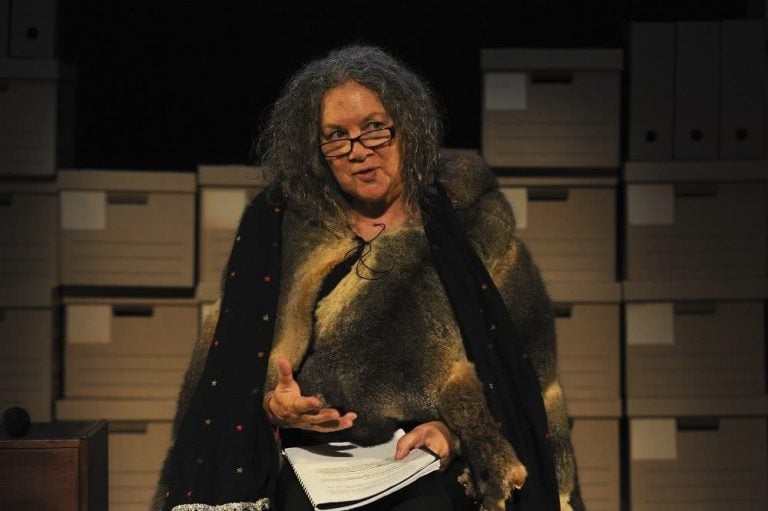Content warning: some of the information below could be distressing to asylum seekers and their loved ones.
Directed and co-conceived by Karen Therese, artistic director of Powerhouse Youth Theatre Fairfield, the political production Tribunal sees artists, lawyers, leaders and activists unite together to put Australia’s colonial past and murky refugee policies on trial, allowing the audience to be the judge.
The play will feature Afghan performer Mahdi Mohammadi and Indigenous activist and Elder Aunty Rhonda Dixon Grovenor. Each performance of the show is set to be different, with guests airing their lived experiences and making public the issues directly affecting their communities from human rights violations, detention centres and strained friendships. In that way, Tribunal has been designed to provide a space where the truth can be told, connections can be made, and intimacies shared.
Therese originally wanted to create a work that addressed both sexual and racial discrimination, and she explored the potential of working with human rights lawyer Joe Tan in a creative capacity. Tribunal is long gestating: it has been in the works since 2013, when Therese and Tan commenced work on the idea of love and boats before turning to statistics for inspiration.
In the same week their research was beginning to take off, an asylum seeker boat crashed near Christmas Island, killing 25 people. The government decided to leave the bodies in the water and not retrieve them, simply because the boat crashed just outside of Australian waters.
“It was really traumatic,” Therese recalls. “It was the first time that I’d really emotionally connected to the crisis of asylum seekers, even though I come from a migrant background. It was really disturbing.”
The need to be to tell the story of asylum seekers as truthfully as possible led Therese to recruit a small army of professionals and refugees, rather than actors. “Everyone in Tribunal is a legitimate lawyer,” she explains. “The two boys in it were asylum seekers. Everyone in Tribunal has a significant, real world experience in their history, as well as some kind of human rights expertise as well.”
Love Music?
Get your daily dose of metal, rock, indie, pop, and everything else in between.
A lot of people haven’t even met an Aboriginal person, let alone know about the history of what happened with colonisation and the Aboriginal protection board.
One of the key performers is Aunty Rhonda, who will serve as Tribunal’s judge. “I hope the audience will understand more deeper and listen with their hearts,” Aunty Rhonda explains. “A lot of them will be surprised, because they don’t know about our Aboriginal history. A lot of people haven’t even met an Aboriginal person, let alone know about the history of what happened with colonisation and the Aboriginal protection board.
“My father was a political activist and I talk about him, because to know where we are today, you have to know what happened. [Tribunal] is all about the question and answer time after it has finished; when people sit down and come up with plans and programs together for healing.”
For her part, Therese says theatre is the most effective way to get a political message of this kind across. “I just think no other medium has theatre’s direct impact. When everyone’s in the room together, we can talk to them; really talk to them.
We don’t want to make people feel bad about what’s happening.
“Tribunal isn’t just a legal proceeding. It breaks down into a cup of tea with the audience, where we all become a part of this issue that we try to work out together. It’s designed to be very kind, and it really requires people to listen. We don’t want to make people feel bad about what’s happening. We just want to point out that this is what is happening, and to ask what are we all going to do about it now.”
See Tribunal for yourself at Sydney Festival where it’ll be showing from Wednesday January 12 to Sunday January 21, 2018.


































